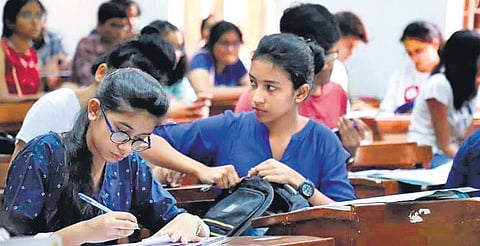

Casting off the shackles of geographical boundaries of the highly inward oriented higher education system since Independence, the New Education Policy has set the stage to take India to the global stage, it long deserved. This has been the first time in the education history of India, that the UGC and the government has taken a bold initiative to integrate Indian higher education system with the international education and making meticulous efforts by evolving implementation strategies and regulations to make it world class.
Higher education in India remained highly inward oriented despite several post-independence reforms in education sector. In terms of number of educational institutions, India has the world’s largest higher education system with about 1,000 universities and 40,000 colleges whereas it ranks third in terms of size and diversity, but its presence in the international education system has been abysmally below its true potential that remains unexplored.
Interestingly, India is also home to world’s second largest English-speaking people after the USA, surprisingly more than the United Kingdom. Despite being the world’s second most populated country with 1.39 billion people accounting for 17% of the world population, India’s share in the foreign students arriving for higher education remains miserably low at 0.85%. This explicitly reveals the fundamental faults in the country’s higher education policy post-Independence.
Moreover, there had been serious regulatory impediments to internationalise and take initiatives on their own by private and also top-class public institutions of national repute. Over the period, government and its key higher education regulatory body UGC became stumbling blocks rather than facilitators in internationalisation efforts.
New Education Policy 2020 is a landmark transformative initiative of the Modi government to address the immensely significant issue of inward orientation of the Indian higher education system and to promulgate a policy framework for its internationalisation that would go a long way not only to improve quality of higher education in India, but also its reach and making it globally competitive. India aims to actively promote itself as the preferred global destination for higher studies offering quality education at fraction of cost compared to developed countries.
Soon after the policy was announced, the UGC deftly plunged into action to put in place legislative framework for internationalisation in a much rapid manner than anticipated. The UGC is in the process of swiftly preparing statutory regulations for academic collaborations between Indian and foreign educational institutions so as to facilitate cross-border academic collaborations and to facilitate award of joint degrees, dual degrees and twinning programmes that would get regulatory recognition under the Indian academic regulatory bodies. Foreign institutions will enter India and provide special dispensation regarding regulatory, governance, and content norms at par with other autonomous higher education institutions in India. This would pave way for collaborative programmes such as twinning programmes, joint and dual degrees, which hitherto have been a dream for Indian university system and other higher educational institutions. Such unprecedented international integration is likely to be a critical milestone in taking Indian education at global stage.
Top class universities from around the world would be encouraged to set up their campuses in India as well as top Indian institutes would be encouraged to internationalise and expand their activities overseas. Each higher educational institute would set up International Students’ offices to facilitate incoming foreign students. The policy envisages a significant rise in the inflow of foreign students for higher studies with emphasis on subjects such as Indology, Indian languages, yoga, arts, music, history, culture, Ayurveda, Siddha and Unani systems of medicines.
The UGC is also in the process of devising a mechanism to conduct admission tests across countries for admission in Indian universities. Expanding overseas reach of Indian University system through online distance learning (ODL) programmes and its due recognition by the UGC is highly commendable. Hybrid programmes and student-faculty exchanges as an integral part of course delivery in the university system — that received severe resistance by Indian regulatory bodies — is posed to accelerate international integration and expansion of Indian higher education.
As a maiden initiative, the Government of India with active support of the UGC is likely to set-up a unified one-stop online information portal to disseminate information for inbound foreign students on education system in India incorporating details of institutions, programmes, seat availability, admission process etc. Special efforts are being made to provide scholarships and other financial assistance to students coming from South Asia, South-East Asia, West Asia, Africa, CIS and Latin America. This has been the first time that Indian missions overseas and the Ministry of External Affairs is actively involved, and several online interactions were held between foreign university experts and their Indian counterparts so as to identify unexplored potential for internationalisation of Indian education system.
Often ambitious policy announcements made in the past struggled to see the light of the day, primarily due to lack to pace of the implementing agencies. However, in the case of New Education Policy, the UGC in close coordination of Ministry of Education not only held consultations across universities and other higher education institutions within India but overseas as well and developed a thorough blueprint for its implementation in a time-bound manner which is soon to be made available to all the stakeholders, including universities, higher education institutes and state governments. The NEP 2020 is going to be a game changer to transform Indian education system and place it at the global stage.
Prof Rakesh Mohan Joshi
Author is Chairperson (Research), Indian Institute of Foreign Trade, Delhi
rakeshmohanjoshi@iift.edu